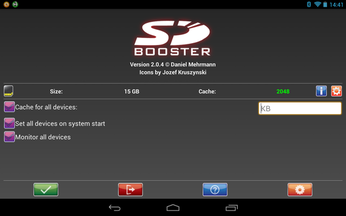Speed up Android Storage with SD-Booster

Productivity Sauce
Slow storage can often be a bottleneck that hampers your Android device's performance. SD-Booster provides a solution to the problem. This app lets you set up cache for each detected storage device, including an external microSD card and internal storage. SD-Booster requires root access, so it only works on rooted Android devices.
Using the app is as easy as it gets. When the app is running, it automatically detects and lists all available storage devices. You can then specify cache for each storage device, or set up cache size for all devices globally. The recommended values are 512, 1024, and 2048. The optimal cache size depends on many factors, and the best way to find out the ideal value for your specific device is to try different settings. One way to find the optimal cache size for an SD card is to use the SD Tools to benchmark the card with various cache settings. SD-Booster also sports a monitoring feature which checks all configured storage devices for errors and fixes the detected problems.
comments powered by DisqusSubscribe to our Linux Newsletters
Find Linux and Open Source Jobs
Subscribe to our ADMIN Newsletters
Support Our Work
Linux Magazine content is made possible with support from readers like you. Please consider contributing when you’ve found an article to be beneficial.

News
-
Keep Android Open
Google has announced that, soon, anyone looking to develop Android apps will have to first register centrally with Google.
-
Kernel 7.0 Now in Testing
Linus Torvalds has announced the first Release Candidate (RC) for the 7.x kernel is available for those who want to test it.
-
Introducing matrixOS, an Immutable Gentoo-Based Linux Distro
It was only a matter of time before a developer decided one of the most challenging Linux distributions needed to be immutable.
-
Chaos Comes to KDE in KaOS
KaOS devs are making a major change to the distribution, and it all comes down to one system.
-
New Linux Botnet Discovered
The SSHStalker botnet uses IRC C2 to control systems via legacy Linux kernel exploits.
-
The Next Linux Kernel Turns 7.0
Linus Torvalds has announced that after Linux kernel 6.19, we'll finally reach the 7.0 iteration stage.
-
Linux From Scratch Drops SysVinit Support
LFS will no longer support SysVinit.
-
LibreOffice 26.2 Now Available
With new features, improvements, and bug fixes, LibreOffice 26.2 delivers a modern, polished office suite without compromise.
-
Linux Kernel Project Releases Project Continuity Document
What happens to Linux when there's no Linus? It's a question many of us have asked over the years, and it seems it's also on the minds of the Linux kernel project.
-
Mecha Systems Introduces Linux Handheld
Mecha Systems has revealed its Mecha Comet, a new handheld computer powered by – you guessed it – Linux.

